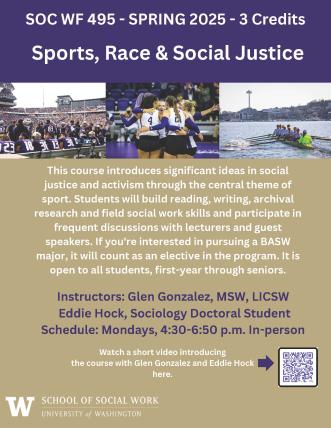Submitted by Stephen Dunne
on
As you register for classes this month, please keep in mind an exciting new elective in the School of Social Work. Please don't let the 400-level course number deter students who are early in their academic careers—the course has been created as an elective that welcomes UW students in all majors and all levels, first-year through senior. If students go on to join the Bachelor of Arts in Social Welfare program (apply by April 15th!), they may use this as an elective for the program.
Our instructors have made a short video introducing themselves and describing what students will learn in the course: https://youtu.be/KBrYa750idI
Sports, Race & Social Justice
SOC WF 495 D, SLN 19893
3 credits
Mondays, 4:30-6:50pm, in-person
Course Overview: This interdisciplinary course, offered through the UW School of Social Work, aims to provide an introduction to major ideas in social work and social justice, both theory and practice, through a central theme of sports. We incorporate materials from history, sociology, social welfare, social psychology, and clinical social work to illustrate the close relationship between race, sport, and social justice. We cover the story of sporting activism in the United States and around the world from the nineteenth century to the present, including a review of major case studies and important sports activists, with a special focus on racial justice and movements for social equality in general. We discuss how sport is incorporated in building community ties and improving resiliency, providing opportunities for social mobility, and helping foster local economies, in particular in neighborhoods on the margins. Students should expect to attend class weekly for lectures, discussions, workshops, and guest lectures by speakers directly involved in this field.
Students interested in this course will build skills in reading, writing, historical and field research, and practical social work. In order to prepare for weekly class discussions, students are expected to complete reading assignments, watch assigned audiovisual materials, and contribute to online discussions. For the final project, students can write a report on a historical case study in sport activism or social engagement not covered by the syllabus, study a current application of sport in social work, or organize their own.
Course Objectives: We want to introduce you to central themes in activism, social justice, and social work through the lens of sport. This course will be particularly useful for students who are interested in pursuing a Bachelor’s of Social Welfare degree or a major or minor in sociology, but we welcome anyone who would like to expand their knowledge and skills in these areas, including student athletes, sports fans, and newcomers to this topic. We hope that, through this class, you will discover new ways of thinking and talking about the crucial role of sport in contemporary society and social engagement, and also that you will, through sport, develop a better understanding of society in general. As Dr. Harry Edwards, the father of the sociology of sport, often remarks, “sport is not the toy department of human affairs.” It is a major site of social engagement, a nexus for activism, and a large sector of many local economies, and understanding changes in the sporting landscape can help us understand - and predict - changes in the social world more broadly. The history of sport reflects and recapitulates the history of human society, and it has never been more relevant than it is today. This course will support your participation in activism, engagement, and social change through sport.
